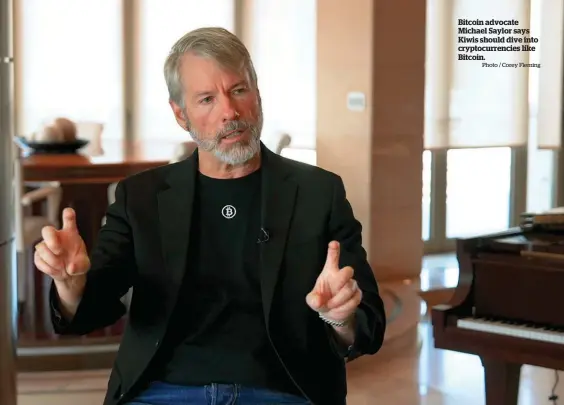Michael Saylor, once a skeptic of Bitcoin, is now one of its most fervent advocates. The executive chairman of MicroStrategy is encouraging New Zealand investors to seize the opportunities presented by Bitcoin, which he describes as an “extraordinary financial opportunity.” Speaking to Markets with Madison in Washington, D.C., Saylor urged New Zealand businesses to follow the example of his company by acquiring Bitcoin as a treasury asset to strengthen their financial positioning.
“The people that really need it [Bitcoin] are the global investors that are not in the major cities,” Saylor explained. “Because you can buy into the most scarce, desirable, global, digital property, and you’re getting the same investment proposition as a New York billionaire.” He went further to stress that New Zealanders may need Bitcoin more than wealthy investors in cities like New York, saying, “Trust fund babies in Manhattan don’t need it; they’ve got a lot of other [investment] options.”
Saylor, who personally holds over $1.1 billion worth of Bitcoin, has made waves in the cryptocurrency world by positioning MicroStrategy as the largest corporate holder of Bitcoin. The Nasdaq-listed technology company has amassed over 225,000 Bitcoins, currently valued at more than $16 billion. His rationale for suggesting New Zealand businesses adopt a similar approach is simple: he believes investing in Bitcoin could transform companies’ balance sheets by aligning them with the high-growth potential of digital assets.
“If you’ve got a company that’s a low-growth company, geared to the New Zealand economy, if you start to invest your balance sheet into Bitcoin, you are now with a 1% grower in New Zealand bolted on to a 50% high-growth, Big Tech, digital monetary network,” he stated. Saylor compared the potential growth of Bitcoin to New Zealand’s business landscape, saying, “How many companies in New Zealand grow 20% a year for 10 years in a row? The odds are just about next to none. But what are the odds of Bitcoin going up 20% a year? That’s actually my bear case.”
This year, the U.S. approval of Bitcoin and Ethereum exchange-traded funds (ETFs) has provided retail and institutional investors with new avenues for low-fee cryptocurrency exposure. Saylor sees this regulatory development as part of a broader trend, foreseeing a future in which banks will accept Bitcoin as collateral for loans, an evolution he calls “the next logical step.” He stated, “If you want to see all the people with the money and the power in the world embrace the asset, they will do it when their vendors support the asset. That’s a rippling thing.”
Saylor’s advocacy of Bitcoin has sparked debate. Some purists in the cryptocurrency community oppose his stance on institutional custody, fearing it could compromise Bitcoin’s decentralized nature. Addressing this, Saylor defended his view, suggesting that institutional involvement could enhance Bitcoin’s safety profile. “I think when the Bitcoin is held by a bunch of crypto-anarchists who aren’t regulated entities who don’t acknowledge government or don’t acknowledge taxes, or don’t acknowledge reporting requirements, that increases the risk of seizure,” he said. “When you have regulated, public entities like BlackRock and Fidelity and JP Morgan and State Street bank holding the asset, well, all the lawmakers and all the law enforcement arms, they’re invested in those entities. So, there’s no way all the senators and all the congressmen are going to seize the assets . . . because that’s where all their retirement money is.”
He praised Bitcoin’s design, attributing its scarcity and resilience to its “immaculate conception” by the pseudonymous creator, Satoshi Nakamoto. Saylor added that Bitcoin’s fixed supply cap of 21 million tokens makes it inherently deflationary, contrasting it with inflation-prone fiat currencies issued by central banks.
Reflecting on his journey from skepticism to staunch advocacy, Saylor explained that his former stance was typical. “Everyone’s against Bitcoin before they’re for it,” he admitted, drawing an analogy to ancient skepticism about fire, saying, “I’m sure the first guy with fire scared a bunch of other tribesmen. No one wants to get burned. Yet without fire, we’re not better than the apes.”
Saylor’s fervor for Bitcoin ultimately stems from his desire to “fix the money.” He asserts that a world reliant on depreciating fiat currency suffers from “toxic capital” that hampers both individual and corporate prosperity. “If the money is broken, all eight billion people have toxic capital,” he said, concluding, “All 300 million companies have toxic capital.”
With a personal commitment to Bitcoin and a vision for its role in reshaping global finance, Saylor’s message to New Zealand is clear: digital assets like Bitcoin present an unprecedented financial opportunity, one that can bridge the gap between local and global investment possibilities.

